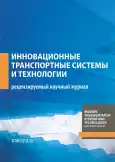Design of equi-strength rotating disk
- Authors: Lyamina E.A.1, Novozhilova O.V.2
-
Affiliations:
- Ishlinsky Institute for Problems in Mechanics RAS
- Bauman Moscow State Technical University
- Issue: Vol 9, No 1 (2023)
- Pages: 122-134
- Section: Original studies
- URL: https://journal-vniispk.ru/transj/article/view/126664
- DOI: https://doi.org/10.17816/transsyst202391122-134
- ID: 126664
Cite item
Full Text
Abstract
Background: Rotating disks, such as flywheels, are an important machine part of engines, which requires the development of the theoretical methods of their analysis and design.
Aim: Determination of the profile of equi-strength rotating disks.
Materials and Methods: Methods of the mathematical theory of elasticity and plasticity
Results: Methodology for determining the profile of equi-strength rotating disks obeying the von Mises yield criterion and its application
Conclusion: The methodology developed can be used to design equi-strength rotating disks subject to various combinations of internal and external pressures. It can be extended to more general yield criteria.
Keywords
Full Text
##article.viewOnOriginalSite##About the authors
Elena A. Lyamina
Ishlinsky Institute for Problems in Mechanics RAS
Email: lyamina@inbox.ru
ORCID iD: 0000-0002-7319-8703
SPIN-code: 6801-0244
PhD, associated professor
Russian Federation, MoscowOlga V. Novozhilova
Bauman Moscow State Technical University
Author for correspondence.
Email: helgam@bk.ru
ORCID iD: 0000-0002-9361-0478
SPIN-code: 8995-7637
PhD
Russian Federation, MoscowReferences
- Genta G, Bassani D. Use of Genetic Algorithms For the Design of Rotors. Meccanica. 1995;30:707–717. doi: 10.1007/BF00986575
- Parmaksizogˇlu C, Güven U. Plastic Stress Distribution in a Rotating Disk with Rigid Inclusion Under a Radial Temperature Gradient. Mechanics of Structures and Machines: An International Journal. 1998;26:19-20. doi: 10.1080/08905459808945417
- Orcan Y, Eraslan AN. Elastic–Plastic Stresses in Linearly Hardening Rotating Solid Disks of Variable Thickness. Mechanics Research Communications. 2002;29(4):269-281. doi: 10.1016/S0093-6413(02)00261-6.
- Eraslan AN. Stress Distributions In Elastic-Plastic Rotating Disks with Elliptical Thickness Profiles Using Tresca and Von Mises Criteria. Journal of Applied Mathematics and Mechanics. 2005;85:252-266. doi: 10.1002/zamm.200210177
- Jalali MH, Jalali MR. Stress Analysis of Rotating Functionally Graded Polar Orthotropic Disk Under Thermomechanical Loading. Journal of Vibroengineering. 2020;22(3):640–656. doi: 10.21595/jve.2019.20575
- Сёмка Э.В. Качественный и количественный анализ упругопластического состояния вращающегося тонкого диска // Вестник Инженерной школы ДВФУ. – 2022. – №4(53). – С. 3–12. [Syomka EV. Qualitative and quantitative analysis of the elastoplastic state of a rotating thin disk. Far Eastern Federal Univercity: School of Engineering Bulletin. 2022;4(4(53):3-12. (In Russ).] Ссылка активна на: 18.03.2023. Доступно по: https://journals.dvfu.ru/vis/article/view/388
- Alexandrov S. Elastic/plastic discs under plane stress conditions. Springer, 2015. doi: 10.1007/978-3-319-14580-8
- Paul SK, Sahni M. Stress Analysis of Functionally Graded Disk with Exponentially Varying Thickness Using Iterative Method. WSEAS Transactions on Applied and Theoretical Mechanics. 2021;16:232-244. doi: 10.37394/232011.2021.16.26
- Sharma D, Kaur R, Sharma H. Investigation of Thermo-Elastic Characteristics in Functionally Graded Rotating Disk Using Finite Element Method. Nonlinear Engineering. 2021;10:312-322. doi: 10.1515/nleng-2021-0025
- Madan R, Bhowmick S. Limit Elastic Analysis of Functionally Graded Rotating Disks Under Thermo-Mechanical Loading. Int J Appl Mech. 2021;13:Article 2150033. doi: 10.1142/S1758825121500332
- Seireg A, Surana KS. Optimum Design of Rotating Disks. Journal of Engineering Materials and Technology, Transactions of the ASME. 1970;92(1):1-10. doi: 10.1115/1.3427709
- Gontarovskii VP, Chebaevskii BP. Profile design of uniform-strength disk by the Mises strength rule. Strength of Materials. 1973;5(10):1257-1259. doi: 10.1007/BF01129410
- Hein K, Heinloo M. The Design of Nonhomogeneous Equi-Strength Annular Discs of Variable Thickness Under Internal And External Pressures. Int J Solids Struct. 1990;26(5/6):617-630. doi: 10.1016/0020-7683(90)90033-R
- Gau CY, Manoochehri S. Optimal Design of a Nonhomogeneous Annular Disk Under Pressure Loadings. ASME Journal of Mechanical Design. 1994;116:989-996. doi: 10.1115/1.2919509
- Durban D, Baruch M. Analysis Of an Elasto-Plastic Thick Walled Sphere Loaded By Internal and External Pressure. Int J Nonlinear Mech. 1977;12: 9-21. doi: 10.1016/0020-7462(77)90012-9
- Alexandrov S, Pirumov A, Jeng YR. Expansion/Contraction of a Spherical Elastic/Plastic Shell Revisited. Continuum Mechanics and Thermodynamics. 2015; 27: 483-94. doi: 10.1007/s00161-014-0365-6
- Alexandrov S, Jeng YR. An Elastic/Plastic Solution for a Hollow Sphere Subject to Thermo-Mechanical Loading Considering Temperature Dependent Material Properties. Int J Solids Struct. 2020;200-201:23-33. doi: :10.1016/j.ijsolstr.2020.03.027
- Bayat M, Saleem M, Sahari BB, Hamouda AMS, Mahdi E. Mechanical and Thermal Stresses in A Functionally Graded Rotating Disk with Variable Thickness Due to Radially Symmetry Loads. Int J Pres Ves Pip. 2009;86:357-72. doi: 10.1016/j.ijpvp.2008.12.006
- Vivio F, Vullo V, Cifani P. Theoretical Stress Analysis of Rotating Hyperbolic Disk Without Singularities Subjected to Thermal Load. Journal of Thermal Stresses. 2014;37:117-36. doi: 10.1080/01495739.2013.839526
Supplementary files















